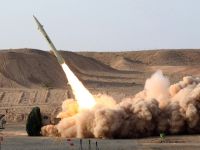Macedonia is to break diplomatic links with Taiwan within two weeks in favor of re-establishing relations with the People's Republic of China, a senior government official in Skopje told AFP on Friday.
Prime Minister Ljubco Georgievski met with Taiwan's Foreign Minister Tien Hung-mao late Thursday and told him of the upcoming decision, which will leave the Holy See as the only state in Europe recognizing Taipei, the official said.
The decision comes after pro-Beijing parties were brought into Macedonia's new government of national unity, which was set up to create a united front to face down an ethnic Albanian guerrilla uprising.
"Macedonia will break off relations with the Republic of China, Taiwan, if not at the next government meeting then within two weeks," the official, who requested anonymity said, "The Taiwan question will then be closed".
The Beijing government in China considers Taiwan a rebellious province, and no country has diplomatic relations with both territories.
Negotiations have already begun to re-establish relations with the People's Republic of China and a delegation led by Zoran Jolevski, President Boris Trajkovski's chief of staff, has visited Beijing, government sources told AFP.
Government spokesman Antonio Milososki said that Georgievski had met with Tien late Thursday at a hotel in the Macedonian lake resort town of Ohrid on the occasion of the European Chess Championship.
Georgievski's support for continued relations with Taipei, which has been a major contributor to the fragile republic's weak economy, was Taiwan's last hope of preserving its a bastion of support in Europe.
Macedonia became the first country in Europe apart from The Vatican to recognize Taiwan on January 27, 1999, when the government signed up to diplomatic links amid talk of up to one billion dollars in inward investment.
Taiwan, which is economically powerful but politically isolated, has funded many projects in Macedonia, and helped with the cost of supporting tens of thousands of refugees from Kosovo during the Yugoslav province's 1999 war.
The two states signed a defense accord on October 30 last year, and were in the process of building a 30 hectare "export processing zone" in fields outside Skopje.
Today the area is still largely an empty site, ringed with fences and signs in English, Macedonian and Chinese promising a free trade area, but there is little sign of the workshops and warehouses housing 25 firms and employing 8,000 people that were envisaged when work began.
Taiwanese lawmaker Lee Shang-ren, who has visited Macedonia on a fact finding trip, told AFP that Taipei had spent an estimated 147 million dollars (173.9 million euros) on various projects in Macedonia.
"The foreign ministry had hoped that by setting up diplomatic ties with Macedonia, it would open another gateway to Europe," Lee said, but warned that Taipei would have to reconsider the investment if diplomatic relations were removed.
Despite Taiwan's largesse the Macedonian president at the time of the deal, Kiro Gligorov, and his successor President Boris Trajkovski have been publicly critical of it.
Macedonia's Foreign Minister Ilinka Mitreva told reporters on Thursday that she would not meet Tien and that she didn't "care if anyone else did.”
Mitreva is a member of the formerly-communist Social Democratic Party (SDSM).
The party was brought into Skopje's ruling coalition two weeks ago with the creation of the unity government.
One of Mitreva's first acts was to announce that "the Macedonian government has recently been stepping up contacts with Chinese communists to discuss the restoration of diplomatic ties.”
Only twenty-nine countries recognize Taiwan, which Beijing regards as a rebellious province awaiting re-unification.
Most of the rest of the world recognizes the government in Beijing as representing the official Chinese state, and the People's Republic is a permanent member of the United Nations Security Council -- SKOPJE (AFP)
© 2001 Al Bawaba (www.albawaba.com)







